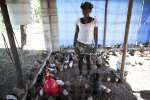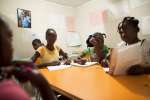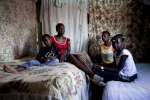UNHCR helping refugees avoid statelessness in Montenegro
News Stories, 5 August 2008

PODGORICA, MONTENEGRO, Aug. 5 (UNHCR) – At the age of seven, Adnan Behuli finally legally exists. Although the young refugee boy was born in a hospital, he was until recently officially "invisible" in Montenegro, because his birth had never been registered.
Now, with the help of UNHCR's legal aid implementing partners, Catholic Relief Services/Legal Centre, the boy has a birth certificate – a legal identity that will allow him to enrol in elementary school this September.
Adnan is one of 4,338 Roma, Ashkaelia, and Egyptian refugees living in Montenegro who fled conflict in Kosovo in 1999. Sometimes called Gypsies, they make up just under one-fifth of the 24,000 refugees from former Yugoslavia who still live in Montenegro.
These days 220 Roma, Ashkaelia, and Egyptian families live in Konik refugee camp in Podgorica, which is managed by the UN refugee agency's implementing partner, the Red Cross of Montenegro. Adnan's father struggles to support his nine children on the 200 euros ($311 U.S.) he earns every month as a street cleaner..
"In addition to extreme poverty and generally low levels of education, the lack of personal documents and/or civil registration represents a serious obstacle to the integration of Roma, Ashkaelia, and Egyptian refugees into mainstream Montenegrin society," says UNHCR's Representative in Montenegro, Serge Ducasse. "Many of their children are denied school registration and they can't get proper jobs or full social services. Without proper documents Roma, Ashkaelia, and Egyptian refugees are not recognized as persons before the law and are often in effect stateless. This statelessness can be carried down to future generations."
Roma often fail to register their children's births. Not having one document leads to a "chain reaction" where individuals are unable to secure other documents and end up without any basic rights. Population movements over decades of conflicts in the Balkans have exacerbated this problem, as documents were lost and families were separated.
A study carried out earlier this year by CRS/Legal Centre found that some 46 percent of Roma, Ashkaelia, and Egyptian refugees living in and around Konik camp were at risk of statelessness
To solve the problem, UNHCR is putting the emphasis on securing legal representation to help Roma, Ashkaelia, and Egyptian refugees from Kosovo in Montenegro navigate the legal hurdles and get registered on a scale never seen before. This is being done through a regional European Union Roma project being implemented in Serbia, Bosnia and Herzegovina, Macedonia, Montenegro and Kosovo.
"We hope that by assisting a large number of cases, we will help bring about systemic changes and make it easier for others to carry out these tasks in the future without lawyers," Ducasse explained.
Little Adnan Behuli is one of the early success stories. "I'm so happy now," says his father, Behrim, who lost an older son during the war in Kosovo and has no desire to go back. Unlike the other children who attend the branch school in the camp, Adnan will now get the chance to go to a local school outside the camp, where the quality of education is much higher, and he will therefore have more opportunities to integrate into wider Montenegrin society.
"I've been feeling guilty all these years," says Behrim, "but now my son will start school and will be able to have an education and hopefully get a proper job, not like his father."
By Charlotte Lyne and Gordana Popovic in Podgorica, Montenegro















































